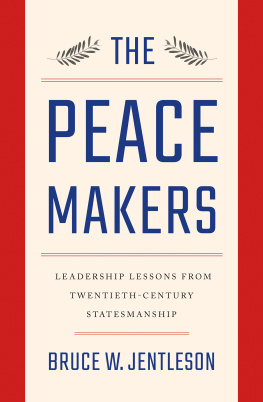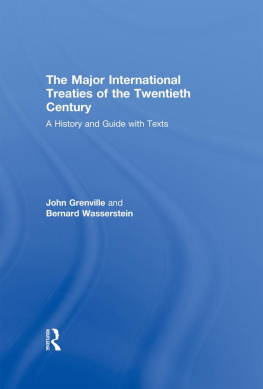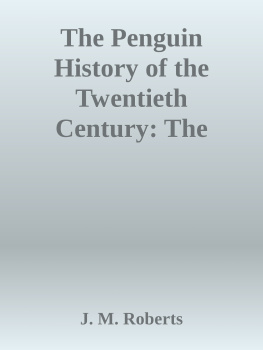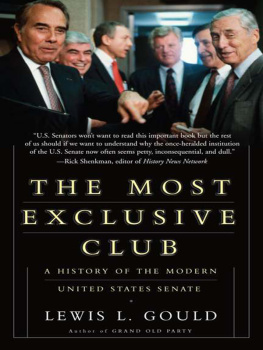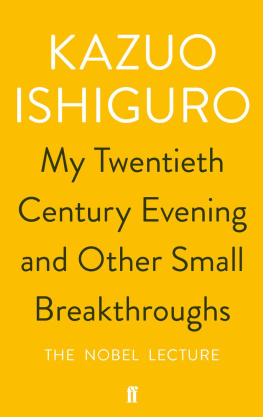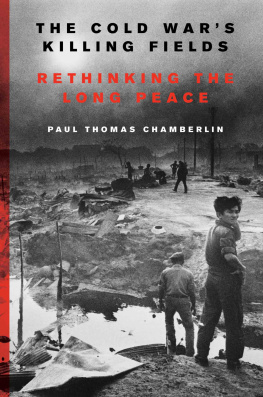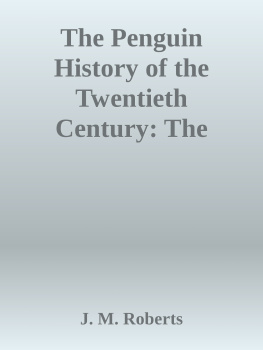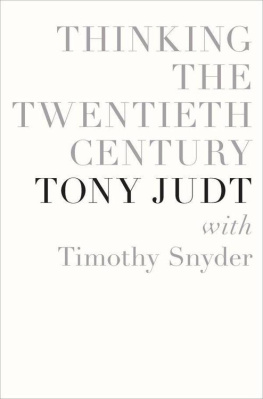Bruce W. Jentleson - The Peacemakers: Leadership Lessons from Twentieth-Century Statesmanship
Here you can read online Bruce W. Jentleson - The Peacemakers: Leadership Lessons from Twentieth-Century Statesmanship full text of the book (entire story) in english for free. Download pdf and epub, get meaning, cover and reviews about this ebook. year: 2018, publisher: W. W. Norton & Company, genre: Politics. Description of the work, (preface) as well as reviews are available. Best literature library LitArk.com created for fans of good reading and offers a wide selection of genres:
Romance novel
Science fiction
Adventure
Detective
Science
History
Home and family
Prose
Art
Politics
Computer
Non-fiction
Religion
Business
Children
Humor
Choose a favorite category and find really read worthwhile books. Enjoy immersion in the world of imagination, feel the emotions of the characters or learn something new for yourself, make an fascinating discovery.
- Book:The Peacemakers: Leadership Lessons from Twentieth-Century Statesmanship
- Author:
- Publisher:W. W. Norton & Company
- Genre:
- Year:2018
- Rating:3 / 5
- Favourites:Add to favourites
- Your mark:
The Peacemakers: Leadership Lessons from Twentieth-Century Statesmanship: summary, description and annotation
We offer to read an annotation, description, summary or preface (depends on what the author of the book "The Peacemakers: Leadership Lessons from Twentieth-Century Statesmanship" wrote himself). If you haven't found the necessary information about the book — write in the comments, we will try to find it.
In the twentieth century, great leaders played vital roles in making the world a fairer and more peaceful place. How did they do it? What lessons can be drawn for the twenty-first-century global agenda?
Those questions are at the heart of The Peacemakers, a kind of global edition of John F. Kennedys Profiles in Courage. Writing at a time when peace seems elusive and conflict endemic, when tensions are running high among the major powers, when history has come roaring back, when democracy and human rights are yet again under siege, when climate change is moving from future to present tense, and when transformational statesmanship is so needed, Bruce W. Jentleson shows how twentieth-century leaders of a variety of typesnational, international institutional, sociopolitical, nongovernmentalrewrote the zero-sum scripts they were handed and successfully made breakthroughs on issues long thought intractable.
The stories are fascinating: Henry Kissinger, Zhou Enlai, and the U.S.-China opening; Mikhail Gorbachev and the end of the Cold War; Dag Hammarskjlds exceptional effectiveness as United Nations secretary-general; Nelson Mandela and South African reconciliation; Yitzhak Rabin seeking Arab-Israeli peace; Mahatma Gandhi as exemplar of anticolonialism and an apostle of nonviolence; Lech Walesa and ending Soviet bloc communism; Gro Harlem Brundtland and fostering global sustainability; and a number of others. While also taking into account other actors and factors, Jentleson tells us who each leader was as an individual, why they made the choices they did, how they pursued their goals, and what they were (and werent) able to achieve.
And not just fascinating, but also instructive. Jentleson draws out lessons across the twenty-first-century global agenda, making clear how difficult peacemaking is, while powerfully demonstrating that it has been possibleand urgently stressing how necessary it is today. An ambitious book for ambitious people, The Peacemakers seeks to contribute to motivating and shaping the breakthroughs on which our future so greatly depends.
Bruce W. Jentleson: author's other books
Who wrote The Peacemakers: Leadership Lessons from Twentieth-Century Statesmanship? Find out the surname, the name of the author of the book and a list of all author's works by series.

